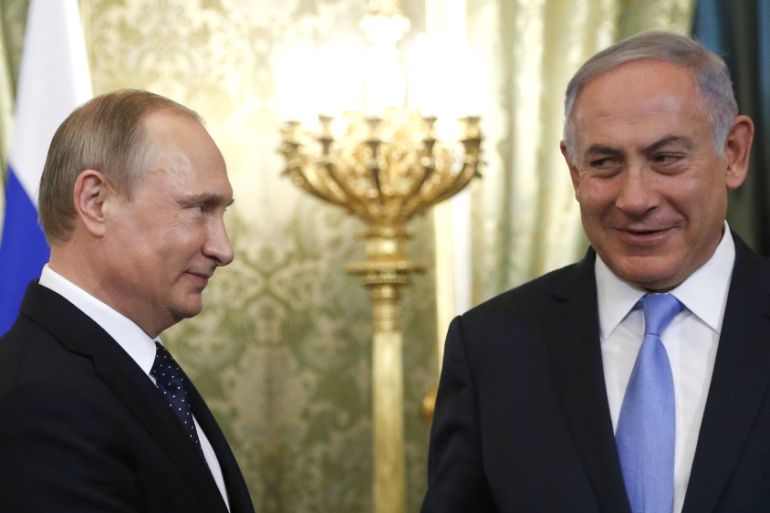What next for Russian-Israeli relations?
Russia’s decision to install the S-300 in Syria increases the risk of unintended confrontation with Israel.

Russian-Israeli relations are currently going through the worst crisis they have witnessed in recent years. On September 17, an incident involving Israeli F-16 jets resulted in the downing of a Russian reconnaissance plane, killing all 15 of its crew members.
The Russian defence ministry accused Israel of being responsible for the tragic incident, saying that the Israeli fighter jets used the Russian aircraft as a shield when the Syrian air defence system started firing at them. It also claimed that Tel Aviv gave a one-minute warning before launching the operation and did not specify that it was going after a target in Latakia province, which is home to Russia’s Hmeimim airbase.
The Israeli government rejected the accusations and even sent a defence delegation to Russia to provide clarification. Its efforts, however, do not seem to have pacified the Russian defence ministry, which on September 24 announced that it was going to deploy a modern S-300 system to Syria.
This could curb Israel’s ability to launch air operations in Syria and exacerbate further the already strained Russian-Israeli relations.
The Tehran problem
When Russia launched its direct military intervention in Syria in September 2015, Israel welcomed it because it saw it as a way to contain Iran.
The two countries reached a mutual understanding not to cross each other’s red lines. While Moscow conceded that Iranian proximity to Israeli borders may be undesirable as it could drag Israel into the Syrian war, Tel Aviv acknowledged the security of the Assad regime was not to be compromised.
Because of their close ties, Israel tolerated the expansion of Iranian forces towards its borders in support of Russian operations in Syria securing the success of the counter-offensive against the Syrian armed opposition.
At the same time, Russia gave Israel considerable operational freedom when it came to its national security interests in Syria. To ensure that there are no problems with Israeli air force operations, from the very start of its direct military intervention in Syria, Russia established a hotline with Israel. And according to former Israeli Defence Minister Moshe Ya’alon, Tel Aviv did not have to inform Moscow of its operations, as the Russian military is able to identify Israeli jets and not interfere in their operations.
Since the beginning of 2018, Israel has intensified its attacks on Iranian and Hezbollah targets in Syria with Russia’s tacit consent. Yet the policy of non-interference in Israel’s limited and calculated operations in Syria was mistakenly perceived by the Israeli government as a nod of approval by Moscow.
Yet, Russia has not made any major moves to contain Iran. In fact, over the past three years, its military successes have allowed Iran to entrench its presence in Syria, shattering Israel’s hopes and straining relations between the two countries. Russian officials, including Russian President Vladimir Putin, have consistently made it clear to Israeli counterparts that they do not see Iran’s presence in Syria as an existential threat to Israel.
Over the past year, Iranian presence in Syria has increasingly become a point of tension between Moscow and Tel Aviv. In February, tensions also escalated after Syrian air defences downed an Israeli jet near the Israeli-occupied Golan Heights. This new development challenged the viability of Russia’s red line and risked erasing Moscow’s political gains in Syria.
Then in May, Russia managed to secure a deal with Israel (and by extension the US) which allowed Syrian forces to advance onto the southern provinces of Deraa and Quneitra after the US abandoned the opposition groups it was supporting there. In return, Russia agreed to keep Iranian forces at a distance of up to 100km from the Golan Heights, according to Russian officials and promised to withdraw Iran-led forces from the country.
This agreement provided a short-term relief for built-up tensions but it failed to established trust between Israel and Russia.
Escalating tensions
The diplomatic fallout from the September 17 incident proves how fragile the Russian-Israeli partnership really is.
The sharp tone of the Russian defence ministry, which is usually cautious when commenting on Israeli activities in Syria, was quite surprising. The statement it released was reportedly first approved by President Putin, who retains personal control over the Israeli diplomatic file.
Russia has been going back and forth on supplying the S-300 defence systems to Damascus for a few months now, fearing Israel’s reaction. Israeli officials made it clear a number of times that they do not approve of such a move.
Thus, Russia’s decision to go forward with it is the strongest message to date that it has sent to Tel Aviv. This move does very little to limit Israeli operations in Syria, but for the first time in its relations with Israel, Moscow puts its words into action.
After the S-300 announcement, the press secretary of the Russian presidency, Dmitry Peskov, accused Israel of “premeditated actions” that led to the downing of a Russian IL-20 in Syria, while Putin rejected the Israeli version of events in his conversation with Israeli PM Benjamin Netanyahu.
These are clear signs that Russia is escalating the issue with Israel, which is likely to have long-term implications for bilateral relations.
The current low in Russian-Israeli relations was only a matter of time once Moscow launched its military campaign in 2015. The close ties the two countries enjoyed are increasingly becoming toxic over disagreements on Syria and Iran’s role there.
While the deconfliction mechanism between the two countries will continue to function, the risk of unintended confrontation between them is higher than ever before.
The views expressed in this article are the author’s own and do not necessarily reflect Al Jazeera’s editorial stance.
